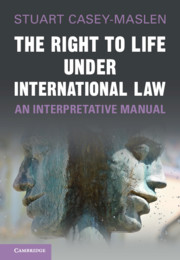Book contents
- The Right to Life under International Law
- The Right to Life under International Law
- Copyright page
- Contents
- Foreword
- Acknowledgements
- Table of Cases
- An Historical Introduction to the Right to Life
- Part I Overview of the Right to Life under International Law
- Part II Major Themes
- 5 Deaths as a Result of Armed Conflict
- 6 Jus ad Bellum, Aggression, and the Right to Life
- 7 The Use of Force in Law Enforcement
- 8 Counterterrorism
- 9 The Death Penalty
- 10 Deaths in Custody
- 11 Abortion
- 12 Euthanasia and Suicide
- 13 Poverty and Starvation
- 14 Assemblies, Demonstrations, and Protests
- 15 Arms Control and Disarmament
- 16 Enforced Disappearance
- 17 Accidents, Disease, and Natural Disasters
- 18 Pollution and Climate Change
- 19 Autonomous Use of Force
- 20 Slavery
- Part III The Protection of At-Risk Groups and Individuals
- Part IV Accountability
- Part V Human Rights Machinery Protecting the Right to Life
- Part VI Outlook
- Index
19 - Autonomous Use of Force
from Part II - Major Themes
Published online by Cambridge University Press: 02 September 2021
- The Right to Life under International Law
- The Right to Life under International Law
- Copyright page
- Contents
- Foreword
- Acknowledgements
- Table of Cases
- An Historical Introduction to the Right to Life
- Part I Overview of the Right to Life under International Law
- Part II Major Themes
- 5 Deaths as a Result of Armed Conflict
- 6 Jus ad Bellum, Aggression, and the Right to Life
- 7 The Use of Force in Law Enforcement
- 8 Counterterrorism
- 9 The Death Penalty
- 10 Deaths in Custody
- 11 Abortion
- 12 Euthanasia and Suicide
- 13 Poverty and Starvation
- 14 Assemblies, Demonstrations, and Protests
- 15 Arms Control and Disarmament
- 16 Enforced Disappearance
- 17 Accidents, Disease, and Natural Disasters
- 18 Pollution and Climate Change
- 19 Autonomous Use of Force
- 20 Slavery
- Part III The Protection of At-Risk Groups and Individuals
- Part IV Accountability
- Part V Human Rights Machinery Protecting the Right to Life
- Part VI Outlook
- Index
Summary
This chapter considers whether the autonomous use of force is compatible with respect for and protection of the right to life. The development of artificial intelligence has given rise to autonomy from human beings in the decision to target individuals with force and the ability to kill them. While weapons systems incorporating features of automaticity of action and reaction have existed for many years, the ever-increasing sophistication – and phenomenal speed – of decision-making by machine mean that both as a means of warfare and in law enforcement, autonomous weapons systems may become commonplace in years to come. The chapter discusses dispassionately whether it is possible to be certain that autonomous use of force in the conduct of hostilities is unequivocally negative for the enjoyment of the right to life during armed conflict.
- Type
- Chapter
- Information
- The Right to Life under International LawAn Interpretative Manual, pp. 400 - 414Publisher: Cambridge University PressPrint publication year: 2021

